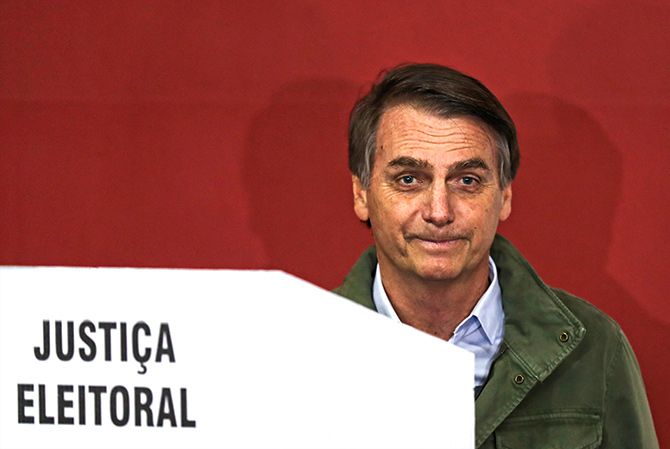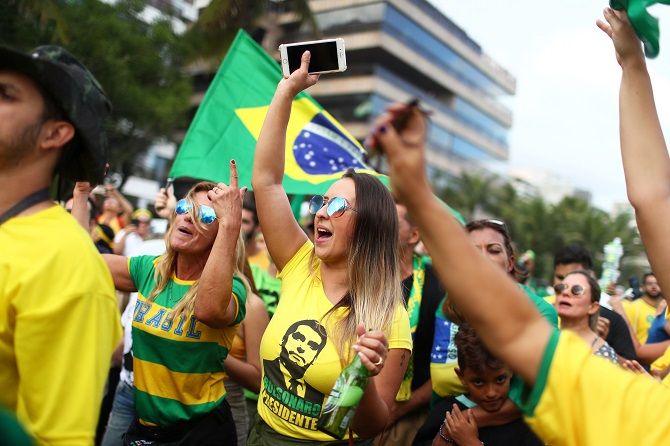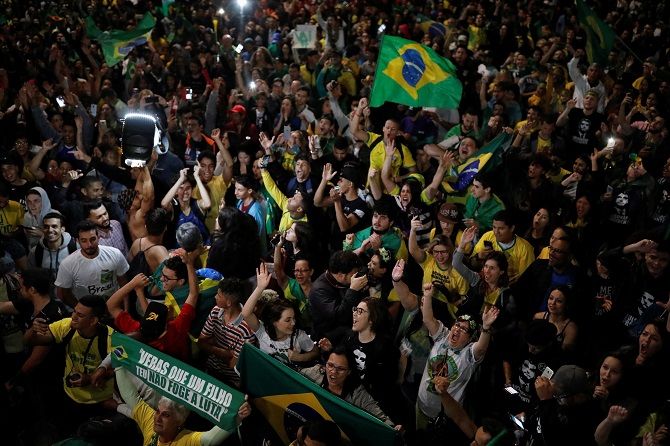'As he has no executive track record, so far, he is all talk and hence essentially a braggart and a bigot.'
'That he is described as the 'Trump of the tropics' should give a short hand summary to what he stands for on issues in general,' points out Ambassador B S Prakash, India's former envoy to Brazil.

Jair Bolsonaro's election as Brazil's next president demonstrates once again that democratic elections can not only yield unpredictable results but lead to undesirable consequences!
Such scepticism about democracy in a self-proclaimed political liberal like me may be frowned upon. But after the bitterness of the Brexit verdict, the chaos caused by the Trump win, and some other alarming fallouts in Europe, there is reason for worrying about electoral outcomes.
What has happened in Brazil, the world's fifth largest country in size as well as in population, and Latin America's dominant nation reinforces this feeling.
Some readers in this space may recall many of my columns from a decade back romanticising Brazil and extolling its many virtues.
I was India's ambassador in Brazil from 2008 to 2012, a kind of a golden period in that country when economic growth was record high, inflation record low, human development indices were all moving upwards, and millions after millions were lifted out of poverty under the rule of then president Lula da Silva, who himself became a poster boy for economic and social reform in the developing world.
The vision of 'inclusive growth' that inspired Lula's Brazil and India were so similar, and our growth trajectories so parallel, that we came together in BRICS and in other forums.
In short, it was a different Brazil, buoyant and hopeful.
I continued to watch Brazil from India and mourned its decline after 2013, again reflected in my column here.
Brazil slowed down, faltered and then fell.
It had a negative growth rate for a few years; its sincere but inept President Dilma Rousseff, who was a protégé of Lula, got impeached; and it got engulfed in wave after wave of corruption scandals.
It is perhaps patriotically and diplomatically incorrect for me to say this, but in my assessment, Brazil's stories of corruption seemed to be of a kind and scale similar to ours, pervasive but accepted with a sense of resignation by society.
What transpired, next, was however, different. Under laws and processes that are complicated to explain, the judges and the prosecutors assumed extraordinary powers and disqualified a majority of politicians of all parties.
They discovered that several organs of the State were not only corrupt, but an entire apparatus of corruption had been institutionalized and entrenched.
For example, opposition legislators got fixed amounts by the government for passing laws that were needed. Giant corporates paid predetermined percentages for getting contracts.
Armed with tools such as telephone transcripts and video recordings, overzealous prosecutors unearthed scandals every day and paralyzed Brazil's normal politics.
Well-meaning people saw it as a necessary act of public cleansing and made heroes out of lawyers.
Political and judicial establishments were at complete loggerheads; Lula, still the most popular leader in that country, was put under arrest and prevented from contesting elections and the conventional politics of the country was thrown into disarray.
On the economic side, the surging exports of commodities from Brazil to China was adversely affected as China decided to cool down its overheated economy somewhat. This had a disproportionate effect on Brail's fortunes and an economy that had been steadily growing at over 6% went into a tail spin with a negative growth rate between 2013 and 2017.
In the meanwhile, an ineffective interim government continued to manage affairs till the scheduled elections were held this month.

Brazil follows a system of direct elections to the office of the president. It has a two stage election process, where in the second round, the top two candidates alone will battle together, if no one has secured a clear majority in the first round.
Like in the US where an anti-establishment Trump stepped in to win defying all expectations, in Brazil too, a relatively unknown figure, Jair Bolsonaro emerged from nowhere gathering momentum in the first round.
He was stabbed at an election rally and his survival after a serious injury added to his appeal. In the second round concluded on October 28, he was victorious with a clear 56% vote.
Who is he, what does he represent and how has he won?
Bolsonaro was hitherto a fringe Congressman from a minor party. His rise and popularity is ascribed to a series of provocative and even outrageous statements further fueled by social media.
There are twin aspects to his appeal: Some of what he says capitalises on the mood of anger and frustration that has characterised Brazil in the last five years, and the other half makes tall promises to segments of a society that yearns to hear reassuring rhetoric.
As he has no executive track record, so far, he is all talk and hence essentially a braggart and a bigot. That he is described as the 'Trump of the tropics' should give a shorthand summary to what he stands for on societal issues in general. Some of his priorities and promises can be dissected further.
First, a big issue in Brazilian elections has become law and order. Big cities like Sao Paulo or Rio have been scarred by violent crime for decades, but the situation has worsened dramatically. There are parts of the city where the police just cannot enter.
I have witnessed scenarios where helicopters deployed to land policemen have been shot and brought down in the middle of the favelas, the infamous slums that are sometimes impenetrable.
In Rio, the situation deteriorated to the extent that the current president ordered military deployment to maintain law and order. Bolsonaro, a former captain in the army is an unabashed admirer of the military which ruled Brazil in the decades between 1965 and 1985.
He is a rare politician who has spoken frequently of the desirability of army rule in a polity where it was blasphemous to do so. For the present, he wants to be ruthless in putting down the gangs who rob and murder and will be firmly on the side of enforcement agencies, much like Trump in the US.
Second, Bolsonaro is no socialist in a country with a strong leftist appeal. He has made it clear that he is an advocate of private ownership, control and management of the economy. His pledges are lowering taxes, pension reform and a greater voice for businessmen.
He is not only inclined to believe that poverty is a result of laziness, but that Afro-Brazilians and the indigenous people are 'obese' as they do not work! His statements criticising the less privileged or the blacks or women can rival that of Trump in their crudity or insensitivity.

Third, in a nation where people have come to the conclusion that all politicians are corrupt, Bolsonaro has a relatively clean image. Ironically, Lula, though deemed corrupt, was popular, but could not contest as I have explained earlier.
Another aspect specific to Brazil where Bolsonaro scores relates to support for evangelical 'born again' forms of the Church in what is a predominantly Catholic country.
The spread of the influence of such churches and their censorious views on abortion, gay rights, LGBT community etc is also a politically divisive issue in Brazil and Bolsonaro takes an illiberal view.
In Bolsonaro's world view, the worst fate that can befall Brazil is to 'become a Venezuela'. An understandable apprehension if we see what is happening in that country, especially in recent years.
Venezuela's path has been towards nationalisation of public assets leading to collapse of the market, breakdown of law and order, rampant inflation and the country being driven to bankruptcy.

Bolsonaro's prescriptions are the opposite: Privatisation, an end to over-regulation, encouragement for foreign investment from the US. His pronouncements so far show him as pro-American, and interestingly wary of China. His warning that 'China is not buying in Brazil; it is buying Brazil' has attracted much notice.
Brazil, like India, is too large, diverse, divided, multi-racial and multi-ethnic to be put in a strait-jacket. The expectation about Bolsonaro is that he will try to be an authoritarian leader, surrounding himself with former military commanders and move against policies that have prevailed for the last 13 years in a country under 'Worker's Party' rule.
It will be curious to see how another Trump like figure -- untested, flamboyant, and seemingly intolerant -- will reveal his real persona.
B S Prakash, a former Indian ambassador to Brazil, is a long-standing Rediff.com columnist whose columns may be seen here.








